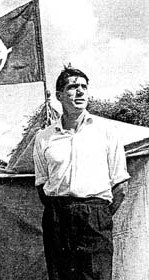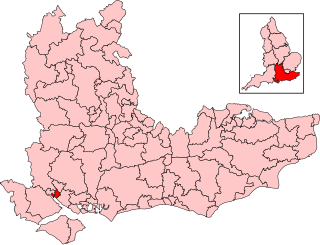Election results
House of Commons
| Election year | # of total votes | % of overall vote | # of seats won | Rank |
|---|---|---|---|---|
| 1964 | 23 | |||
| 1966 | 17 | |||
| 1970 | 14 | |||
| 1974 | 30 |
The National Democratic Party (NDP) was a right wing political party that operated in the United Kingdom during the 1960s and 1970s. The NDP sought to position itself as an early rival to the National Front although ultimately it failed to challenge the position of this group. [1]
The NDP had existed on paper since the early 1960s as the title was used by Dr David Brown in both the 1964 and 1966 general elections to contest the Ipswich constituency, securing 0.6% and 1.3% of the vote in the respective elections. [2] [3] However this NDP had no existence beyond Brown and it was not until 1966 that a process of formalisation as a proper political party took place.
In 1966, Brown, who was also the chairman of the Racial Preservation Society, proposed to form the NDP by merging the RPS with John Bean's British National Party. [4] However this did not occur as Bean was put off by Brown insisting that the Greater Britain Movement should be excluded from any alliance and that Brown should be sole leader of the new party. [4] Following this Brown entered negotiations with A.K. Chesterton about using the League of Empire Loyalists as the basis for the NDP but this plan was rejected by Chesterton as once again Brown insisted that leadership should lie with him alone. [5] The National Front, effectively a merger between the BNP, LEL and elements of the RPS under Robin Beauclaire followed soon afterwards, with Brown excluded.
Despite this set back the NDP was established officially in 1966 before the NF although critics, particularly from within the NF, argued that Brown only did so as he could not stand the prospect of serving under A. K. Chesterton. Amongst the leading members of the party upon formation was Leslie Eric 'Lutz' Vaughan who had been associated with the National Socialist Movement's Spearhead paramilitary wing and Column 88. [6]
In its early years, the Party expanded through mergers with a number of smaller movements, including the British Defence League, a small group based around ex-Conservative John O'Brien. [7] Another group to join was the Association of British People, a 200 strong group from Birmingham that opted for the NDP after turning down the overtures of the National Front's Martin Webster. This group took the lead in the campaign in the Birmingham Stechford seat where the party won 3.% of the vote in the 1970 general election. [8] In the same election the NDP had managed the largest vote share of any far-right group competing in Southampton Itchen, where it won 21.8% of the votes. Southampton was the seat of the Speaker of the House of Commons however, and traditionally, re-election of the Speaker is unopposed by other major parties. [9] Dr. Brown, meanwhile, won an improved 3.7% vote share in Ipswich, a seat he continued to contest until his final election in February 1974. [10] With only 2.5% of the vote secured for its candidate in Leicester North West, and although the party had attracted some disaffected Conservatives who supported Enoch Powell, there was a general feeling within the NDP that the election had been disappointing for them. [11]
O'Brien had already left the NDP to join the NF before the election, although he maintained close links with (Anthony) AFX Baron, whose East Anglia Forum was affiliated to the NDP. [12] Chesterton had long hoped to merge the NF with the NDP, a party that he believed contained less of a loutish element than his own NF, and he felt that O'Brien's appointment as NF chairman would hasten this aim due to O'Brien's good standing with NDP activists. [9]
The party had held informal discussions with the NF about a merger in early 1970, although these came to nothing as the NF fell into upheaval resulting in the removal of Chesterton from the leadership. [7] The issue came back on the agenda with O'Brien as NF leader and certainly the two groups grew closer and the NDP was persuaded to withdraw its proposed candidate from the St Marylebone by-election in 1970 and instead campaign on behalf of the NF's Malcolm Skeggs. [9] A merger was discussed and O'Brien presented such a proposal to the NF Directorate but they refused to endorse the idea. [13] Nonetheless the two groups were able to continue with a closer working relationship and in 1971 leading NDP member Eddie Bray even brought a coachload of party members to Bristol where they joined an NF march in the city. [13] The relationship was not always beneficial, however, such as when the important Manchester branch left en bloc, under the direction of organiser Walter Barton, to join the NF after a particularly rousing speech by O'Brien. [14]
In May 1971 Eddie Bray stood as a candidate in the Southampton Itchen by-election. In the seat where the party had performed well in the previous general election the NDP once again made a good showing with Bray winning over 7.5% of the vote and finishing ahead of the Liberal Party candidate. [15]
The NDP was weakened when O'Brien left the NF and joined the National Independence Party rather than bringing his followers back to the NDP. O'Brien left the NF because of John Tyndall and Martin Webster's neo-Nazi links [16] The party tried to carry on but it became less and less significant. The emergence of other outlets for the populist tendency of the far right, such as the National Party, meant that support for the NDP disappeared. Towards the end of its life the NDP attempted to forge links with rightist groups associated with the Conservative Party such as the Conservative Monday Club and the Anglo-Rhodesia Society, although the party was gone by the late 1970s. [10] Around this time future Tory MP Piers Merchant was a member of the party. [6]
The NDP was not connected to the National Democrats, which was an attempt by the NF to change its name. This resulted in a split in the NF.
| Election year | # of total votes | % of overall vote | # of seats won | Rank |
|---|---|---|---|---|
| 1964 | 23 | |||
| 1966 | 17 | |||
| 1970 | 14 | |||
| 1974 | 30 |

John Hutchyns Tyndall was a British neo-fascist political activist. A leading member of various small neo-Nazi groups during the late 1950s and 1960s, he was chairman of the National Front (NF) from 1972 to 1974 and again from 1975 to 1980, and then chairman of the British National Party (BNP) from 1982 to 1999. He unsuccessfully stood for election to the House of Commons and European Parliament on several occasions.

The National Front (NF) is a far-right, fascist political party in the United Kingdom. It is currently led by Tony Martin. A minor party, it has never had its representatives elected to the British or European Parliaments, although it gained a small number of local councillors through defections and it has had a few of its representatives elected to community councils. Founded in 1967, it reached the height of its electoral support during the mid-1970s, when it was briefly England's fourth-largest party in terms of vote share.
The League of Empire Loyalists (LEL) was a British pressure group, established in 1954. Its ostensible purpose was to stop the British Empire's dissolution. The League was a small group of current or former members of the Conservative Party led by Arthur K. Chesterton, a former leading figure in the British Union of Fascists, who had served under Sir Oswald Mosley. The League found support from some Conservative Party members, although most of the Conservative leadership disliked it.
John Edward Bean was a British political activist and writer, who was a long-standing participant in far-right politics in the United Kingdom, and a number of its movements.

Andrew Fountaine was an activist involved in the British far right. After military service in a number of conflicts, Fountaine joined the Conservative Party and was selected as a parliamentary candidate until his outspoken views resulted in his being disowned by the party.
The National Party of the United Kingdom (NP) was a short-lived splinter party from the British National Front (NF). It was formed on 6 January 1976, and was dissolved in 1984.
The Constitutional Movement was a right wing political group in the United Kingdom. It was formed in 1979 by Andrew Fountaine as the National Front Constitutional Movement, a splinter group from the National Front. Offering a more moderate alternative to the NF, the Constitutional Movement claimed to have 2,000 members by 1980.
The Greater Britain Movement was a British far right political group formed by John Tyndall in 1964 after he split from Colin Jordan's National Socialist Movement. The name of the group was derived from The Greater Britain, a 1932 book by Oswald Mosley.

Southampton, Itchen is a constituency represented in the House of Commons of the UK Parliament since 2024 by Darren Paffey from the Labour Party (UK). Before then, it had been held since 2015 by Royston Smith GM of the Conservative Party, who had announced his retirement from frontline politics in 2023 and did not seek re-election in 2024.
Anthony Reed Herbert was a leading member of the British National Front (NF) during the 1970s, organising the party in Leicester and serving as its chief legal adviser.
The British National Party (BNP) was a neo-Nazi political party in the United Kingdom. It was led by John Bean. The group, which was subject to internal divisions during its brief history, established some areas of local support before helping to form the National Front in 1967. Scholar Nigel Fielding described the BNP as having a "firmly Nazi" ideology.
John O'Brien was a British far right politician, known for being a leading figure on the far-right during the early 1970s.
The National Independence Party was a minor far-right party that appeared in British politics during the 1970s. The party was led by John Davis and campaigned on a platform similar to that of the much bigger National Front (NF) on anti-immigration, anti-European Economic Community, anti-communism themes.
Richard Charles Mitchell, commonly known as Bob Mitchell, was a Labour Member of Parliament (MP) in the United Kingdom. He represented Southampton Test for Labour from 1966 to 1970, and Southampton Itchen for Labour and then the Social Democratic Party from 1971 to 1983.
A by-election was held in the British House of Commons constituency of Epping Forest on 15 December 1988, following the death of Conservative Member of Parliament (MP) Sir John Biggs-Davison. The result was a hold for the Conservative Party.
Roy Painter was a former leading figure on the British far right.
The Racial Preservation Society was a far-right pressure group opposed to immigration and in favour of white nationalism, national preservation and protection in the United Kingdom in the 1960s.
Edward Budden was a British veteran of the far right who was well known in such circles for his satirical columns that appeared in a number of publications down the years.
The history of the National Front, a far-right political party in the United Kingdom, began in 1967, when it was founded by A. K. Chesterton.